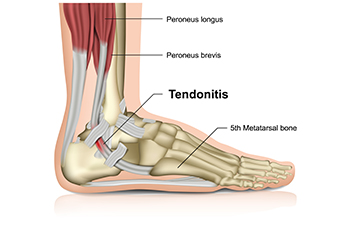
Anyone who has experienced an Achilles tendon injury is all too familiar with the intense pain this condition can cause. This is considered to be the largest tendon in the body, and its function is to connect the calf muscles to the heel. It is responsible for pushing off while walking, running, and jumping, in addition to pointing and flexing the foot. Many patients have heel pain with this type of injury, and it can happen from overuse. People who increase speed and mileage too quickly while running may be prone to a partial or fully ruptured Achilles tendon. Additionally, it may happen from standing on uneven surfaces for most of the day, or possibly from wearing shoes that do not fit correctly. This may help to weaken the tendon, and may gradually lead to the development of this type of injury. The symptoms can include tenderness in the calf and heel area, and it is often difficult to walk. It typically takes several months for this type of injury to completely heal and lifestyle changes may need to occur to avoid stress on the Achilles tendon. If you suffer from an Achilles tendon injury, it is strongly advised that you seek the counsel of a podiatrist who can offer you the correct treatment practices.
Achilles tendon injuries need immediate attention to avoid future complications. If you have any concerns, contact Deann Hofer Ogilvie, DPM of Ascend Foot & Ankle Center. Our practitioner can provide the care you need to keep you pain-free and on your feet.
What Is the Achilles Tendon?
The Achilles tendon is a tendon that connects the lower leg muscles and calf to the heel of the foot. It is the strongest tendon in the human body and is essential for making movement possible. Because this tendon is such an integral part of the body, any injuries to it can create immense difficulties and should immediately be presented to a doctor.
What Are the Symptoms of an Achilles Tendon Injury?
There are various types of injuries that can affect the Achilles tendon. The two most common injuries are Achilles tendinitis and ruptures of the tendon.
Achilles Tendinitis Symptoms
- Inflammation
- Dull to severe pain
- Increased blood flow to the tendon
- Thickening of the tendon
Rupture Symptoms
- Extreme pain and swelling in the foot
- Total immobility
Treatment and Prevention
Achilles tendon injuries are diagnosed by a thorough physical evaluation, which can include an MRI. Treatment involves rest, physical therapy, and in some cases, surgery. However, various preventative measures can be taken to avoid these injuries, such as:
- Thorough stretching of the tendon before and after exercise
- Strengthening exercises like calf raises, squats, leg curls, leg extensions, leg raises, lunges, and leg presses
If you have any questions please feel free to contact our office located in Lafayette, CO . We offer the newest diagnostic tools and technology to treat your foot and ankle needs.
